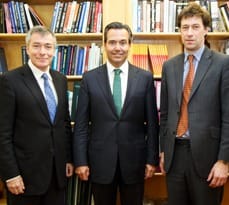
Lead by example and look after the customer were the top themes when Lloyds Group Chief Executive António Horta-Osório took questions from a group of Executive MBA students at Cambridge Judge Business School (5 February 2014).
The audience of EMBAs and other guests heard from Mr Horta-Osório on his own career journey and his philosophy of leadership before putting a range of penetrating questions to him.
Over 20 years since he took his MBA (best student, Insead 1991), Mr Horta-Osório said the course has stood him in good stead throughout a career that has taken him from Goldman Sachs through nearly two decades at Santander and finally to Lloyds in 2011:
“The value of having classmates from other cultures is something I have drawn on throughout my career. People are at their best when they listen and learn from each other; it also gives companies a competitive advantage and allows them to achieve great things.”
His decision to join a Lloyds reeling from the banking crisis made him one of the most visible figures in global banking, and was a challenge he did not take up lightly:
It was a difficult decision to leave Santander after 18 years but, for me, the most compelling reason was the impact that Lloyds has on people living in the UK – arguably more than any other institution. But imagine arriving on day one to find a large, complex business that was three months away from running out of money and had major problems, not least toxic assets!
His four-point strategy to address Lloyds’ issues was to build a strong new team at the top, tackle legacy issues head-on, re-establish relations with all stakeholders and create a new strategy to take the bank forward. This involved making difficult personnel decisions (only 40 out of the existing top 200 senior managers survived), withdrawing from operations in 30 countries, and concentrating on creating a simpler and more agile presence in the UK.
One of his major early decisions was to break ranks with the industry by committing to repaying customers mis-sold PPI:
Even though it cost shareholders, it was the right decision for the bank and for the customers. The main thing that went wrong for the banks is that they lost sight of the customer and lowered their risk standards, bringing in high-return products like PPI. This must change and banks must go back to their roots with simple functions and a focus on the customer.
Three years after the strategy began to be implemented, Lloyds is “beating our targets and getting the customers money back. Customer complaints have halved in two years. Lending to SMEs is up by five per cent and overall growth of three per cent has been achieved across all businesses in a declining environment.” The lesson? “Once you set your course you must stick to it through thick and thin. Too few organisations follow through the strategies they have set.”
But many challenges remain for Lloyds, not least a new regulatory environment and reviving competitors. The bank will shortly launch its ‘Prosper Plan’ to take advantage of what Mr Horta-Osório calls this “unique window of opportunity to help the UK to thrive”. The EMBA audience was given a preview of the goals which include helping more than 80,000 customers to buy their first home, increased lending to SMEs, 40 per cent of senior roles filled by women by 2020 and £100 million pledged to the banks charitable giving.
He has no illusions that the targets Lloyds has set itself will be easy: “It will not happen overnight. It will require us to do the right thing over and over again.”
Asked about the purpose of banks generally, Mr Horta-Osório said they had a duty to give back to society, after receiving so much help from taxpayers: “We manage banks for all stakeholders, not just shareholders. A healthy economy needs a healthy banking sector.”
A final question asked him to reflect on a world where the gap between haves and have-nots is widening. He had this message for governments:
It is a big problem that the rich are becoming richer and the poor poorer. The solution is education. The best way to help people is to educate them and governments have to really invest in this.
And his advice for a rewarding career? Lead by example, look after the customer, work very hard, take new challenges, hire the best people with the best characters and, above all, keep learning.

